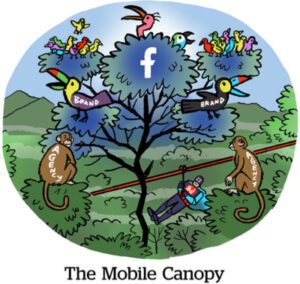Here’s today’s AdExchanger.com news round-up… Want it by email? Sign up here.
Can You Put A Price On … Price?
Google is testing “Higher price” and “Lower price” indicators for shopping searches.
Brian Freiesleben, an SEO industry observer and practitioner, spotted the badge in the wild on a $760 fireplace from Home Depot. It was marked “Higher price” and informed him that fireplaces typically cost $290. In another case, the “Lower price” badge was on a $65 Ikea coffee table. (Coffee tables are typically $250, apparently.)
Google is in a shopping ads overhaul.
For one, Google Smart Shopping campaigns, retail media ads that connect product inventory feeds to search results, disappear this year. They’re being folded into Performance Max campaigns – which connect to product inventory feeds, too, but Google bakes its own first-party data into Performance Max optimization and channels campaigns to owned-and-operated media: Search, YouTube, Maps and Gmail.
Google could expect pushback on pricing badges. After all, Google doesn’t have a badge that says, “Fireplaces are typically higher quality than this.”
Only power users who are part of beta programs are seeing the badges so far, however.
“I personally was unable to replicate this and I thus expect to see tons of fireplace and fire pit ads following me around for a while now,” writes Barry Schwartz at Search Engine Roundtable.
When “None Of Your Business” Is Your Business
France’s data regulator ordered publishers to cease using Google Analytics and Facebook Connect, a server-side product that syncs company data directly to Meta identity data. They have 30 days to discontinue use or risk potential fines, Adweek reports.
Google has tried to insulate itself from this attack. Google Analytics will stop logging IP addresses starting July 2023 and last month introduced country-based data server networks, so data can be collected in France and not sent to US servers.
But the issue is out of Google’s hands. Unlike GDPR cases based on consent requests or ad targeting, the problem here is the US government’s (illegal in Europe) practice of surveilling all web data and tracking individuals without a warrant or citizen’s right to sue.
“In the long run, we either need proper protections in the US, or we will end up with separate products for the US and the EU,” according to a statement by Max Schrems, who initiated the case overturning the Privacy Shield last year and the new suits against Google Analytics. “I would personally prefer better protections in the US, but this is up to US legislators, not to anyone in Europe.”
CNN Minus
CNN and McKinsey, its consultancy, expected to net two million CNN+ subscribers in year one. By year four, it would surpass 15 million subscribers.
Fast-forward three weeks, CNN+’s numbers are painfully low. Anonymous sources told CNBC that CNN+’s daily viewer count was below 10,000.
CNN+ is already pulling every lever it can to increase sign-ups. It’s offering half-off for life to anyone who signs up by April 26. Yikes.
And now CNN+ expects heavy cuts as the parent company regroups, Axios reports. The goal to reach stand-alone profitability in four years is out the window.
CNN’s prelaunch goals are out of whack, however. At $6, CNN+ is relatively cheap, but not so compelling. Disney+ launched at $7, but brought the entire magic kingdom. CNN+ is closer to Salesforce+ than Disney+, in terms of its library. And Salesforce+ can absorb nonadoption because it’s a marketing gimmick.
Acquisition costs were no joke either. CNN+ spent $300 million on the service, including around $100 million in prelaunch marketing (gulp). It had $1 billion budgeted for CNN+ over the next four years – but its prelaunch marketing looks like a sunk cost.
Comparing CNN+ to Salesforce+ is cruel, but this could be another Quibi.
But Wait, There’s More!
TikTok will earn 2.4% of US digital advertising revenue, more than Snapchat and Twitter combined, and the gap is widening. [Ad Age]
OpenWeb, the publisher comment moderation vendor, acquires the French ad network Adyoulike for $100 million. [WSJ]
Adobe Digital Price Index shows continued online price inflation. [release]
Digital advertising grew 35% to $189 billion in 2021, according to the IAB Internet Advertising Revenue Report. [release]
FTC Chair Lina Khan calls for a paradigm shift on data privacy. [WaPo]
EX.CO acquires AI-based recommendation company Bibblio. [release]
You’re Hired!
Dianomi, ad tech in financial services, hires Adform vet Martin Hill as first head of programmatic. [release]
















